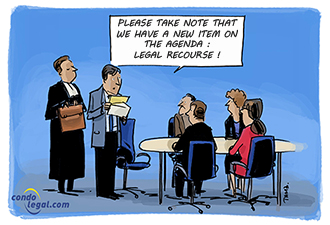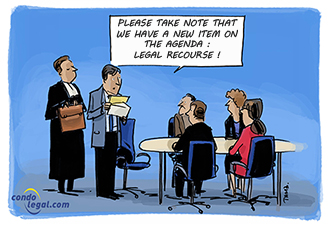 The juridical personality of the syndicate is distinct from the one of the co-owners and directors. His acts are binding only on himself, besides for the exceptions provided by law. The faults committed by the syndicate have consequences only on its own civil liability and not on the directors. Under these conditions, they are held harmless by the syndicate and assume no responsibility for any costs, expenses, charges or losses they have incurred for the administration of the building and the syndicate. This is the basic principle, but it is important to bring several nuances to it.
The juridical personality of the syndicate is distinct from the one of the co-owners and directors. His acts are binding only on himself, besides for the exceptions provided by law. The faults committed by the syndicate have consequences only on its own civil liability and not on the directors. Under these conditions, they are held harmless by the syndicate and assume no responsibility for any costs, expenses, charges or losses they have incurred for the administration of the building and the syndicate. This is the basic principle, but it is important to bring several nuances to it.
Duties and obligations of the director
The directors have the status of mandataries of the syndicate. They cannot be held personally responsible for the actions taken in this capacity, provided that they have acted within the limits of their mandate. They must, in particular, respect the obligations imposed on them by law and the constituting act of co-ownership.
Remember that the law provides that a director must act with prudence and diligence. He must also act honestly and loyalty in the interest of the legal person. The constituting act of co-ownership sets out the duties and obligations of the board of directors and by necessity those of the directors.
In this regard, the declaration of co-ownership generally provides that the directors may, in order to make a decision, rely in good faith on the opinion or report of an expert legally authorized to provide such expertise and are, in such a case, presumed to have acted with prudence, honesty and loyalty, in the best interests of the syndicate.
Obligation of means
The directors have an obligation of means towards the syndicate and the co-owners. Although it is not to be expected from them to find perfection, the directors must use all the resources at their disposal to ensure the preservation of the immovable, the maintenance and administration of the common portions, the protection of the rights appurtenant to the immovable or the co-ownership, as well as all business in the common interest. They must ensure that the work necessary for the conservation and maintenance of the building is carried out.
Personal liability regime
Article 337 of the Civil Code of Quebec allows, in certain circumstances, to hold personally liable a director of a legal person, such as a syndicate of co-owners. The common civil liability regime provides that a person who has committed a fault (who has thereby caused damage to others) will be held liable for compensation for the damage suffered. Directors' personal liability is not limited to cases of breach of the duty of care and diligence. Fraudulent acts, bad faith, abuse of rights and breach of a rule of public order are other factors that may affect the personal liability of the director.
Directors' Liability to the Syndicate
The director assumes an obligation towards the syndicate to act in the interests of the syndicate. He may incur liability if he does not respect his duties (prudence, diligence, honesty and loyalty). This implies that the director must take necessary measures to remain well informed, as willful blindness has no place here. He may also incur liability if he exceeds the limits of his mandate. The beneficiary of this responsibility is the syndicate itself and not the co-owners.
For example, a director could be held responsible for:
Liability of the director towards a co-owner
In the event of negligence, abuse of rights or failure to act, the civil liability of a director could be retained for the damage suffered by a co-owner. The most frequent cases are the neglect to enforce the declaration of co-ownership. For example: do not take into account repeated noise complaints submitted by a co-owner. This could be the case for the installation of a floor covering in a unit that does not comply (with the soundproofing standards provided for in the declaration of co-ownership).
A director may also incur liability when he abuses the powers and authority conferred on him by the declaration of co-ownership. For example, when a co-owner is ignored, excluded or ridiculed because he does not share the opinions of the board of directors.
Liability of the director to a third party
It is possible for a director to breach his or her general duty of care and honesty, thereby causing harm to a third party, such as a syndicate creditor. Thus, if a director makes false representations, falsifies documents or fails to negotiate in good faith, the director could be held liable for such a breach.
Joint and several liability
Each of the directors who commits a fault, having caused the same damage, has a joint and several obligations, with the other directors who have also committed a fault, towards the victim. If he does not want to be held responsible for a decision made by the board of directors, he must then dissociate himself from it by recording his dissent in the minutes or what stands in its place (Article 337 of the Civil Code of Québec). In addition, a director absent from a meeting of the board is presumed not to have approved the decisions made at that meeting. However, the use of dissent should only be used with respect to important matters or decisions and in no way as a tactic of the director.
Implementation of the liability regime
To engage the civil liability of a director, it is necessary for the syndicate, a co-owner or a third party to demonstrate:
If this fault is related to the non-performance or improper performance of the obligations provided for in the declaration of co-ownership, the liability is said to be contractual. If it is not related to the declaration of co-ownership or any other contract, it is said that the liability is extra-contractual.
Liability insurance
Directors' liability insurance became mandatory on April 15, 2021. In addition, this insurance product is taxed in several declarations of co-ownership. It covers the liability of the members of the Board of Directors. The declaration of co-ownership may also specify the amount of coverage. This insurance not only has as its object the protection of the directors, it also allows the syndicate and the co-owners to be adequately covered, in the event that a director commits faults, errors, negligence or omissions in the exercise of his functions.
 WHAT YOU SHOULD KNOW! The failure of the directors to insure the immovable adequately may be considered a breach of their duty to act with prudence and diligence towards the syndicate. Insurers generally do not cover directors for this fault. In such cases, the directors at fault would be exposed to be required to indemnify, from their own funds, the injured co-owners and third parties.
WHAT YOU SHOULD KNOW! The failure of the directors to insure the immovable adequately may be considered a breach of their duty to act with prudence and diligence towards the syndicate. Insurers generally do not cover directors for this fault. In such cases, the directors at fault would be exposed to be required to indemnify, from their own funds, the injured co-owners and third parties.
 WHAT TO KEEP IN MIND: A director must never lose sight of the interest of the community of co-owners. Even if you are an unpaid volunteer director, you may incur civil liability, just as if you were remunerated, although generally the extent of the damages caused by a volunteer is assessed less rigorously by the courts.
WHAT TO KEEP IN MIND: A director must never lose sight of the interest of the community of co-owners. Even if you are an unpaid volunteer director, you may incur civil liability, just as if you were remunerated, although generally the extent of the damages caused by a volunteer is assessed less rigorously by the courts.
 WARNING! In a decision rendered in 2014, the Court of Québec held three syndicate directors personally liable. Although the financial stakes were modest, this case demonstrated that directors who refuse to submit a claim to the syndicate’s insurer to the detriment of the co-owners can engage their own liability.
WARNING! In a decision rendered in 2014, the Court of Québec held three syndicate directors personally liable. Although the financial stakes were modest, this case demonstrated that directors who refuse to submit a claim to the syndicate’s insurer to the detriment of the co-owners can engage their own liability.



